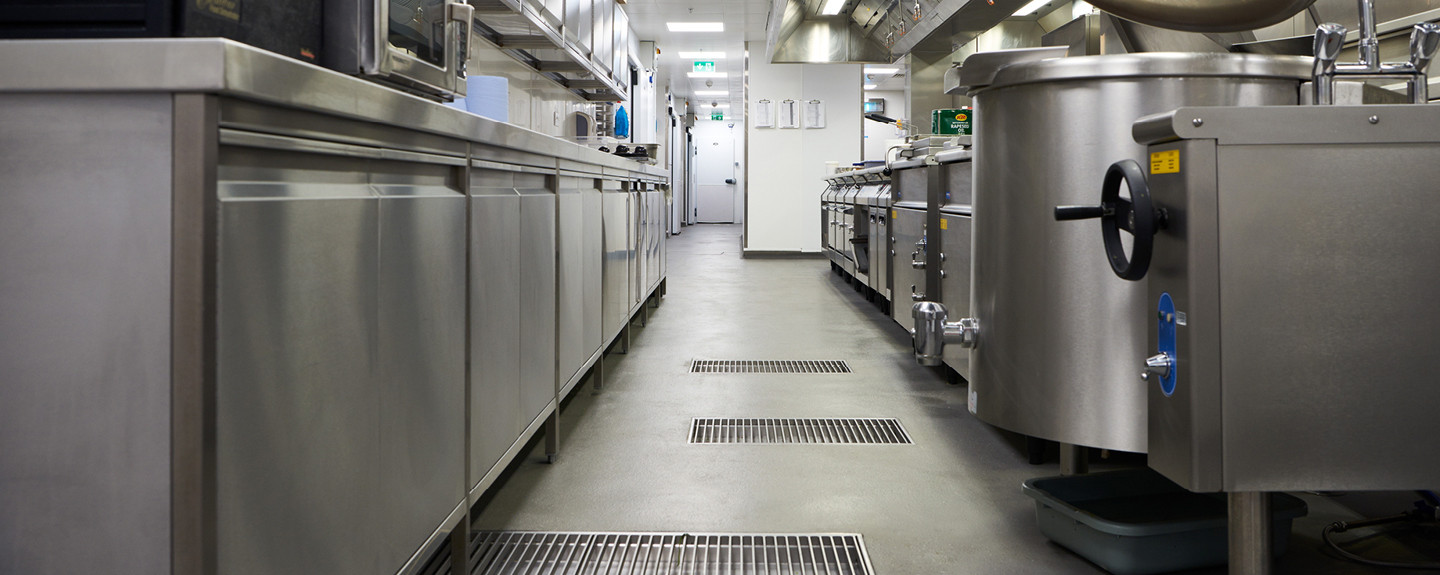Go back to basics for best resin flooring performance
By Jeremy Waterhouse, Flooring Product Manager, Sherwin-Williams
Developments in flooring are progressing at a rapid pace, now delivering anti-microbial benefits which dramatically reduce the risk of bacterial surface growth. However, in the food and beverage industry this should be taken as an additional benefit and not as a substitute for good practices, including a regular cleaning regime. This article provides a thorough assessment of what these good practices should be.
Installing the correct surface is key
A key part of the HACCP (Hazard Analysis and Critical Control Point) principles that food businesses must adhere to is cleanability – meaning installing industrial flooring which is balanced between being non-slip and easy to clean.
When planning the cleaning regime and techniques for a manufacturing plant or warehouse, there are key points to consider: from the specification of flooring types at installation stage through to the chemicals and equipment used in the cleaning process.
Resin floors are formed from a range of base polymers, including epoxy and polyurethane, and are supplied in a wide range of finishes which can be tailored to the needs of the end user. One frequent issue with a resin floor is the balance between slip resistance and cleanability. Some flooring solutions with built-in aggregate, which reduce the potential for slipping, can also require more intensive and abrasive cleaning techniques. Similarly, a matt finish will require more thorough cleaning than a gloss finish due to the former’s micro texture.
The appropriate cleaning regime is determined by several factors, and the best practice is to discuss these needs with an applicator and resin manufacturer as part of the specification process, as well as carry out localised cleaning trials in non-visible areas before treating the entire surface.
Soft or medium bristles recommended
Similarly, consideration must be given to the cleaning equipment and products that will work best to ensure resin surfaces can remain hygienic. The original scrubbing brush technique or mops and buckets have been left behind by mechanically driven machines with pads or brushes. Think about the choice of bristle rigidity paramount to balancing thorough cleaning with protecting the integrity of the flooring.
At Sherwin-Williams, our experts generally recommend soft to medium bristle brushes, as these work well on most surfaces. However, best practice is to only use brushes which follow the profile of a resin floor. In very coarse systems, the use of a pressure washer and potentially steam cleaning can be an effective preferable method of removing the soiling. This option should only be used on resin flooring systems which have been suitably specified and installed to withstand such processes.
Sherwin-Williams has formulated a range of resin flooring and maintenance cleaning products using natural and ecologically sound materials, which contain no caustic alkalis, harmful solvents or aggressive biocides. They are safe in use and have a superior environmental profile. Selecting the correct cleaning materials for your flooring can substantially help to break down the soiling and lift it from the floor surface, provided it is applied correctly and allowed to work on the surface for a defined period before being washed away.
Resistant to attack from sugars and acids
Great care must also be taken to ensure the correct flooring system is chosen with regards to the cleaning chemicals and residual sugars, particularly in the food and beverage industry. Sugars and acids can act very corrosively with epoxy flooring. Similarly, factories which undertake a Clean-In-Place regime which involves cleaning interior equipment and fittings with corrosive acids and sodas and then washing them away with hot water can find it has a potentially fatal effect on epoxy flooring systems.
In these scenarios, the FasTop™ flooring range by Sherwin-Williams, including FasTop RS69 and FasTop TG69, provides the best performance in terms of chemical resistance, hygiene, cleanability and slip resistance.
FasTop product range offers multiple hygiene benefits
FasTop, the HACCP-certified, food-safe resin flooring polyurethane screed range from Sherwin-Williams, offers considerable (and in some cases unique) benefits to food and drink manufacturers. The backbone of its polymer chemistry includes natural resins extracted from plant sources as well as synthetic resins with a Campden BRI certification for non-taint properties and HACCP’s food safety validation. Recently, the FasTop range became available in a new innovative packaging concept where the resin components are supplied to site in pouches instead of buckets, contributing to a much cleaner job site and reducing the amount of waste generated in the installation phase. The pouches use less than one-fifth of the weight of plastic used for plastic buckets with this product. As a result, twice as much product can now be delivered on each pallet, with empty pouches taking up 40 times less space compared to used buckets. This means reduced waste from packaging, which makes waste disposal more economical.
Such sustainability and safety enablers add to a combination of other features that positively impact both installation and service phases of its life cycle. The industry-leading range has been formulated to allow installation in a single application which cures in a matter of hours using the above-mentioned innovative and sustainable cementitious urethane resin technology. The long-term protection it provides is anchored in its self-sealing, self-levelling and slip-resistant properties with tolerance to steam cleaning, boiling water and process liquids up to 120°C and down to -40°C for freezer temperatures.
Provided with a range of optional primers and topcoats that further enhance the ability to adapt the systems to different technical and aesthetical demands, FasTop solutions are ideal for use in a wide range of industries, from food and beverage preparation, processing and handling premises to pharmaceutical and chemical plant processing and heavy-duty plant and traffic areas.
For expert advice on optimal flooring solutions for your food and beverage facility, or cleaning your resin flooring, contact the Sherwin-Williams team today.




